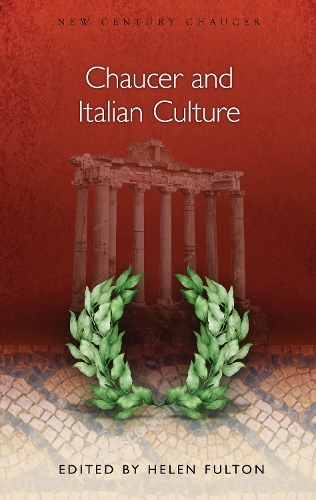
Chaucer and Italian Culture
(Hardback)
Publishing Details
Chaucer and Italian Culture
By (Author) Helen Fulton
University of Wales Press
University of Wales Press
26th April 2021
United Kingdom
Classifications
Professional and Scholarly
Non Fiction
Literary studies: ancient, classical and medieval
European history
821.1
Physical Properties
Hardback
288
Width 138mm, Height 216mm
Description
Chaucerian scholarship has long been intrigued by the nature and consequences of Chaucers exposure to Italian culture during his professional visits to Italy in the 1370s. In the eight chapters of Chaucer and Italian Culture, leading scholars take a fresh and holistic view of Chaucers engagement with Italian cultural practice, moving beyond the traditional sources and analogues approach to reveal the varied strands of Italian literature, art, politics, and intellectual life which permeate Chaucers work. Each chapter unfolds, from a different lens, links between Chaucerian texts and Italian intellectual models, including poetics, choreography, visual art, classicism, diplomacy, and prophecy. Echoes of Petrarch, Dante, and Boccaccio reverberate throughout the book, across a rich and diverse landscape of Italian cultural legacies. Taken together, these eight chapters cover a wide range of theories and references while sharing a united understanding of the rich impact of Italian culture on Chaucers narrative art.
Reviews
The eight essays in this volume reinvigorate the study of Chaucers reception and representation of Italian culture by reconceptualizing the ways in which we might approach his work. Chaucers relation to Petrarch gains depth and nuance . . . and his acquaintance with developments in Italian painting casts new light on both his political engagements and his interaction with Boccaccios works. Chaucer and Italian Culture is a book anyone interested in cross-cultural translation will want to read.
-- Warren Ginsberg, University of Oregon
Addressing important topics such as diplomacy, topography, vision, painting, and language, Chaucer and Italian Culture also offers unusual and illuminating approaches to subjects such as the poetics of haunting, prophecy, and civic ritual. With essays by established scholars alongside contributions from a new generation of medievalists, the collection is a timely addition to research on Chaucers European identity.
-- Nick Havely, University of York
Author Bio
Helen Fulton is professor of medieval literature in the Centre for Medieval Studies at the University of York.
